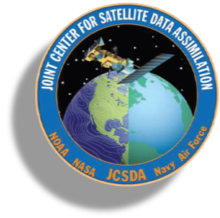The 5th JEDI Academy was the first virtually hosted Academy by the JCSDA. It was conducted via Zoom the week of November 16 - 20, 2020. Typically JEDI Academies are held in person, serving as outlets for networking and face-to-face collaboration across partnering institutions and communities. According to participants, the 5th Academy was an excellent learning and networking experience despite the virtual environment.
JEDI-FV3 1.0.0 and CRTM 2.4.0 Releases
JCSDA Announces the Public Release of CRTM version 2.4.0
JCSDA Announces the First Public Release of JEDI-FV3
The Joint Center for Satellite Data Assimilation (JCSDA) is pleased to announce the first public, open-source release of the Joint Effort for Data assimilation Integration (JEDI) system on October 28, 2020. JEDI is a community effort developed and distributed by the JCSDA, a multi-agency research center with its operations hosted by the University Corporation for Atmospheric Research (UCAR).
Near Real-Time Monitoring of NOAA Operational GNSS Radio Occultation Observations with the JEDI Unified Forward Operators Library
Near Real-Time Monitoring in JEDI of the First Geostationary Hyperspectral IR Sounder FY-4A GIIRS
Hyperspectral IR sounder data from U.S. (i.e., NASA’s AIRS and JPSS CrIS) and European (EUMETSAT’s IASI) sensors has proven to be one of the biggest observational contributors to improved model forecast skill at national and international operational Numerical Weather Prediction (NWP) centers. In October 2019, the JCSDA launched a collaboration with the Space Science and Engineering Center (SSEC) at the University of Wisconsin to support the assimilation of geostationary hyperspectral infrared data in the Joint Effort for Data assimilation Integration (JEDI) framework.
Version 3.0 of JCSDA’s Community Radiative Transfer Model (CRTM)
The Community Radiative Transfer Model (CRTM) allows us to make the best use of the billions of dollars spent on earth-observing satellites for operational data assimilation, calibration and validation, and post-processing applications. CRTM version 3.0 will extend the capabilities of CRTM v2.3, while maintaining backward compatibility; consequently, there will be very little operational risk to test or upgrade to CRTM v3.0.
First Public Release of the Joint Effort for Data assimilation Integration (JEDI) System Targeted for Fall 2020
JEDI to Go: High-Performance Containers for Earth System Prediction
JCSDA's Joint Effort for Data assimilation Integration (JEDI) is an innovative, next-generation data assimilation system that leverages modern software development practices to optimize both performance and extensibility. As the software approaches its initial public release, the JEDI user community continues to grow in size and diversity. All this diversity means that users will want to run JEDI on a range of computing platforms, from state-of-the-art HPC systems (on-premise Supercomputers) to cloud instances, to small linux clusters to laptops. Containers to the rescue!






